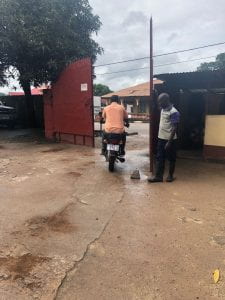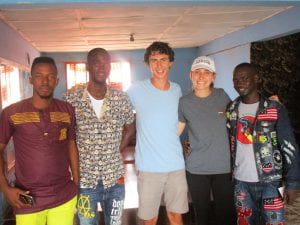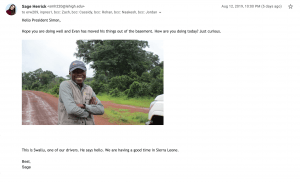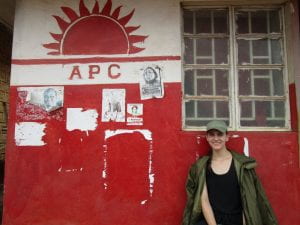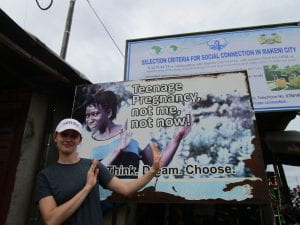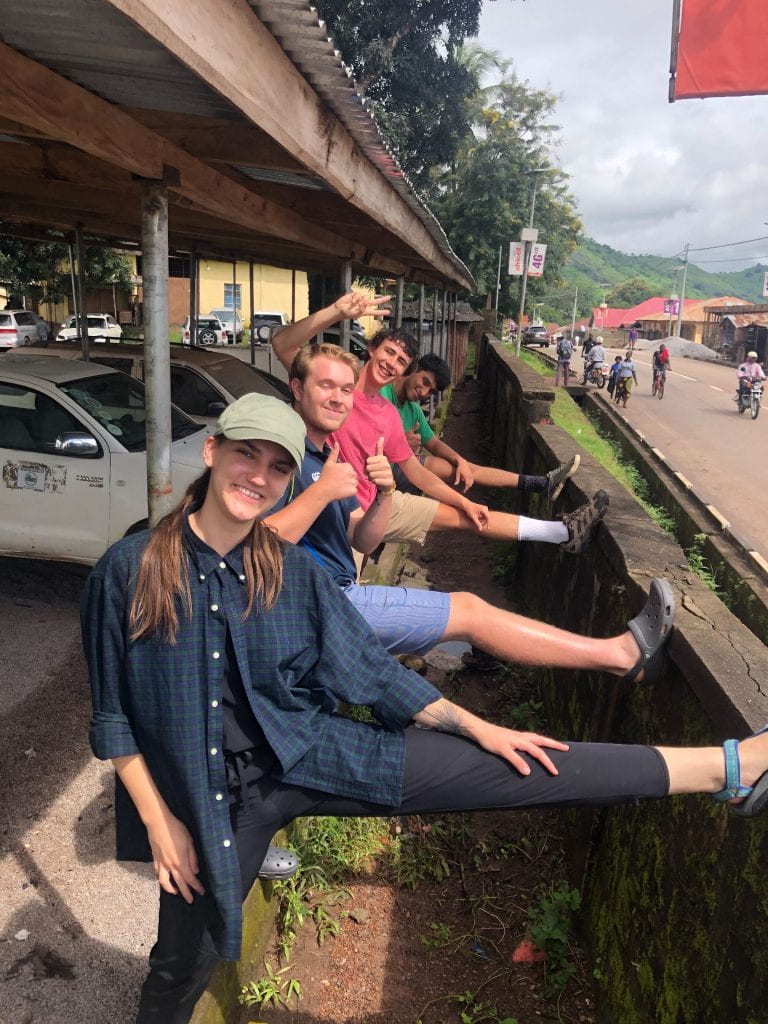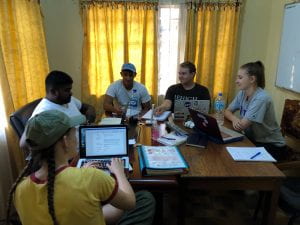Well folks, we have reached the final day in Makeni. Tomorrow we will be off to Freetown to meet with the World Health Organization and meet with our other worker for Ukweli, Allieu.
To start off the day, the team finalized the messaging packets that Hassan will use to train community group leaders on how to make their community members more aware of UTIs, Preeclampsia, and the need to get screened for these health issues. After all the edits were made, the squad rolled on over to the print shop in the market for the 17th time to print and laminate (fancy) the packets. Although Naakesh had a nightmare that the lamination would have set the pages and the print shop on fire, everything came out clean and the packets are ready to be presented to the Bombali District.
Upon returning World Hope with 5 cucumbers, 3 bananas, and 5 mangos, we finalized the pre-marketing license employee contract for Hassan and sent it over to Saidu (DC (Director of Country)) and Joseph (In HR (Human Resources)). The two gave the contract the green light and Saidu signed it, so all that is left is for Hassan and Allieu to sign it and we’ll be ready to rock and roll. We will transition to a different contract once we get the marketing license approved.
The next order of business was procuring Hassan’s bike. Rohan crawled out of his darkroom and emerged to help Hassan with his new whip. The licensing process turned out to be exceptionally frustrating because everyone Rohan needed to talk to left the World Hope office at the same time. Don’t worry though, readers, Rohan was able to get Hassan’s bike licensed and even got him a helmet. There are still some questions as to whether Hassan can take the bike home but we are choosing not to worry about it. All you need to know is that a bike is currently in Hassan’s abode.
We had a super productive meeting with Bockarie and Sylvester in the finance controller office and they agreed to store our inventory in Makeni (480 boxes). Naakesh, Rohan, and Zach loaded up our bucket and it fit pretty well.
Hassan then read over the employee contracts and explained to us some interesting anecdotes about traditional medicine. For example, an herbalist can crush up a live chicken with herbs and incorporate that into a cast which will cure a dislocated shoulder. Sierra Leone is wild.
We headed to dinner with the rest of the GSIFs (minus the sickle cell team, who were in Freetown) and had some rice, beans, potatoes, and bread. We had the 1st annual GSIF talent show. Ukweli’s acts were in three parts, but Hassan stole the show and part of Jordan’s trousers. We began with Rohan and Sage performing Bonnie Tyler’s Total Eclipse of the Heart, then the whole Ukweli team joined them onstage to perform Billie Jean a Capella. Then, something incredible happened. The moment we all had been waiting for had finally arrived, when it was time for Hassan to lift a bag of rice with his teeth. Unfortunately, there was no bag of rice to be found and it’s expensive as hell (280,000 SLL per bag!) so we gave him a bag of concrete. He lifted gracefully but still was not mollified. He asked Jordan to come up with him and be the bag of rice. Jordan lay flat on his stomach. Hassan stooped down, a dangerous glare in his eyes. He attached his mouth to Jordan’s belt loop and tried to lift him, using only teeth. As you can imagine, Jordan’s belt loop gave out but he did catch some air. I have seen some wild things in my life, but I have never seen a man try to lift another man by his pants using only teeth. Sierra Leone is wild.
Many people dressed in African clothes today (partially because it was the only clean shirt I had left) and Khanjan ended up #twinning with Jordan. Unfortunately, Khanjan was eating when Jordan asked him for a picture together and we are still bummed that Jordan didn’t get to touch Khanjan’s forehead. There’s always the fall semester — don’t give up on your dreams, Jordan!
We had some tearful goodbyes and took some time to reflect on the genuine human connections we have made in such a short time. We had a fun sing-a-long where Ibrahim danced and Jwara did some freaky stuff with his arms. It was surreal to eat our last meal at Mbinti’s and say goodbye the people that have made our work here possible. We wouldn’t be able to do this without the dedicated translators and drivers on the World Hope staff or Hassan, so this goes out to them.
Signing off, this is Zach. See you tomorrow at 5:15 AM, GMT.
